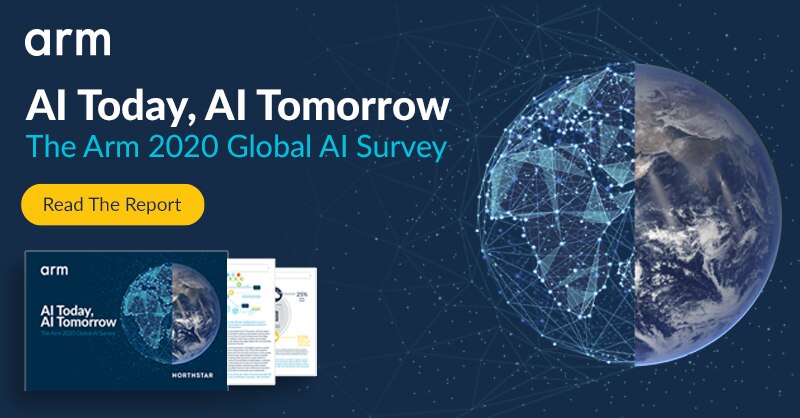Read the Arm 2020 Global AI Survey

A world made better by artificial intelligence (AI) has been one of humanity’s longest-held technological visions, and in 2020 that vision is undoubtedly being realized. AI is in our pockets, our homes, our cars, our workplaces and it’s already making a real difference to how we experience the world around us.
AI Today, AI Tomorrow: The Arm 2020 Global AI Survey explores the opinions of almost 4,000 consumers from around the world. Conducted by Northstar Research on behalf of Arm, it paints a picture of AI acceptance in 2020. It’s a guidebook to how people feel about the advancement of intelligent technology already reshaping many human experiences.

Today, Arm is at the center of AI devices. Through a combination of Arm Cortex CPUs, Arm Mali GPUs and Arm Ethos NPUs, we’re enabling advanced AI use cases capable of transforming industries and user experiences on 85 percent of the world’s mobile devices and a vast number of AIoT devices such as smart home appliances, wearables and sensors.
But what are those AI use cases? What AI-assisted technologies are currently most popular? What makes people comfortable with one AI-based technology and uncomfortable with another? Where are the opportunities for device manufacturers and what are the risks?
To find out, we presented consumers participating in the Arm 2020 Global AI Survey with a range of AI use cases, and asked them how comfortable they felt about each one. Some were already mainstream: a device that controls your heating and lighting, for example.
Others were more hypothetical, such as a car that intervenes if the human operator begins driving poorly or a television that recognizes young viewers in order to impose content restrictions. As you’ll discover, there’s certainly a line to be crossed between comfort and concern.
Another key theme in this report is what consumers perceive AI is, and what it isn’t. The good news is that consumers can clearly differentiate reality from sci-fi dystopia: fewer than 1 in 10 respondents in the Arm 2020 Global AI Survey defined AI as describing human-like android robots that talk, walk and feel human emotions or have any element of self-awareness or free will. While these elements aren’t inherently negative, it’s certainly a relief to see most consumers recognizing the reality of AI as it exists today.
However, one thing that stands out for me is that public awareness of AI seems highly dependent on the visibility of its application. Northstar makes an interesting distinction between ‘visible’ and ‘invisible’ AI: at one end of the spectrum we have the most tangible AI devices such as robots, while at the other are those algorithms silently and seamlessly improving our experience behind the scenes. Case in point, 90 percent of respondents in the Arm 2020 Global AI Survey understood that voice assistants such as Alexa make use of AI. But when we asked the same about online shopping sites, streaming video services and social media—all employers of AI and machine learning—almost a third didn’t think they did.

You’ll find a great deal of positivity towards both current and near-future AI applications in the report, but it’s always worth remembering the high stakes for AI. As awareness over the level of personal data that AI needs to perform well has grown, so has demand for security.
So much so that concern around data privacy extends to a one-chance mentality for many. More than a third of respondents said they would switch to a competitor’s product should an AI device they use be hacked, and a further third would consider stopping using that device category altogether.
But while awareness and concern might fluctuate across use cases, there’s a clear understanding that AI is all around us. In every country, age group and demographic in the Arm 2020 Global AI Survey, over half of respondents felt AI is already having an impact on the way they live and the world around them.
It’s time to stop talking about AI as a futuristic technology and begin talking about how we’re adapting to it as a force already enhancing so many aspects of our daily lives.
Read the Arm 2020 Global AI Survey now and discover whether consumers prefer AI ‘in their face’ or as a silent helper, the top five benefits consumers want in their smart homes and just how many consumers say they could love an AI like they love a human.
Any re-use permitted for informational and non-commercial or personal use only.











